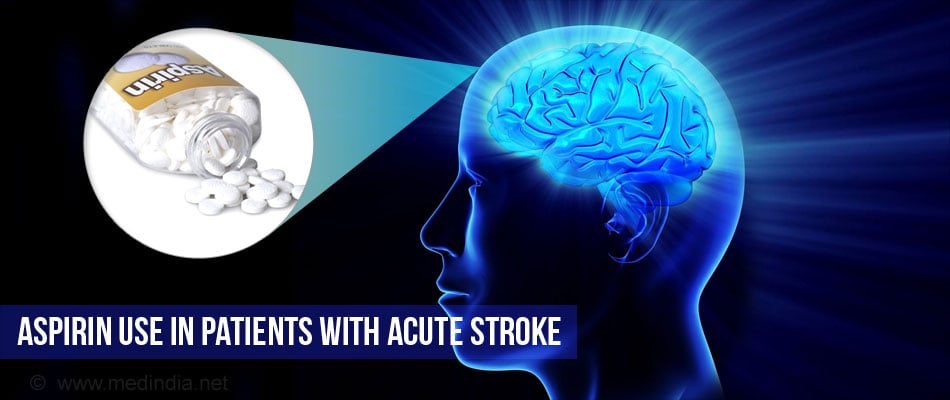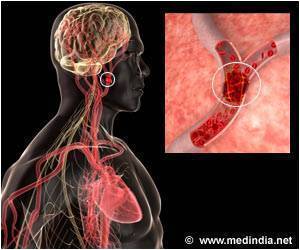
- Aspirin is used in treating a neurological condition called transient ischemic attack (TIA) followed by acute stroke, but the major adverse effect of bleeding in brain restricts its use in many cases.
- A better, more intensive treatment regimen involving anti-platelet therapy with a different mechanism of action might be more effective than aspirin in reducing the risk of transient ischemic attack, stroke as well as recurrent ischemia.
- Ticagrelor is an oral, reversible drug which leads to platelet inhibition and helps in blood thinning. It is considered more effective than clopidogrel in reducing stroke, ischemic attack as well as cardiac related deaths.
A transient ischemic attack (TIA), commonly known as mini stroke, is similar to a stroke, with an exception of shorter duration of onset and lack of permanent brain damage. In a TIA, the patient has symptoms like blank expression face, blinking eyes repeatedly, licking lips, for a few seconds to minutes. An acute stroke occurs due to sudden bleeding or severely reduced blood supply to brain tissues, leading to oxygen and nutritional deficiency to the delicate brain cells. Epidemiology
Aspirin and Ticagrelor
Aspirin, at a dose of 50 to 325 mg daily, has been found beneficial for patients with occlusive vascular disease. However, its role in reducing occlusive vascular disorders without previous history of disease is limited. Studies report 10-15 % of recurrence after three months of transient ischemic attack. Moderate doses increase the risk of bleeding/hemorrhagic events, including gastrointestinal bleeding. Ticagrelor, a potent anti-platelet agent, is a directly acting drug which reversibly binds and inhibits the P2Y12 receptors on platelets. It is an effective agent for patients with acute coronary syndrome with or without ST-segment elevation. It reduces the mortality rate as well as incidence of acute myocardial infarction leading to a decreased risk of stroke. Even in patients with a history of myocardial infarction, ticagrelor has shown good results by reducing the risk of cardiovascular deaths and stroke. Its effect on bleeding is inconclusive as studies report disparate results. However, an increased rate of major bleeding is an adverse effect associated with the use of aspirin.
Randomized Clinical Trial (SOCRATES)
A recent study conducted by Johnston et al., 2016 demonstrated the outcomes of Stroke or Transient Ischemic Attack Treated with Aspirin or Ticagrelor and Patient Outcomes (SOCRATES) trial which was designed to compare ticagrelor and aspirin as a treatment regimen for acute stroke or transient ischemic attack as well as an agent to prevent major vascular events such as stroke [ischemic or hemorrhagic], myocardial infarction, or even death. The study was conducted over a 90 day period. The study was conducted at international level enrolling 674 centers in 33 countries, including 13,199 patients with a diagnosed history of non-severe ischemic stroke or high- risk transient ischemic attack. The patients who did not have a history of treatment with intravenous or intra-arterial thrombolysis (dissolution of blood clot) as well as cases with cardioembolic stroke were not included. The participating patients were randomly assigned to receive either ticagrelor at a loading dose of 180 mg followed by 90 mg twice daily till 90 days or aspirin at a loading dose of 300 mg on first day followed with 100 mg daily till 90 days. The treatment was started within 24 hours after onset of symptoms. The time to the occurrence of stroke, myocardial infarction, or death within 90 days was considered as primary end point.
Future Prospective
References:
- Giles MF, Rothwell PM. Risk of Stroke Early After Transient Ischaemic Attack: a Systematic Review and Meta-analysis. Lancet Neurol 2007;6:1063-1072.
- Valkhoff VE, Sturkenboom MC, Hill C, Veldhuyzen van Zanten S, Kuipers EJ. Low-dose Acetylsalicylic Acid Use and the Risk of Upper Gastrointestinal Bleeding: a Meta-Analysis of Randomized Clinical Trials and Observational Studies. Can J Gastroenterol 2013;27:159-167.
- Johnston SC, Amarenco P, Albers GW, et al. Acute Stroke or Transient Ischemic Attack Treated with Aspirin or Ticagrelor and Patient Outcomes (SOCRATES) trial: Rationale and Design. Int J Stroke 2015;10:1304-1308.
- Wallentin L, Becker RC, Budaj A, et al. Ticagrelor Versus Clopidogrel in Patients with Acute Coronary Syndromes. N Engl J Med 2009;361:1045-1057.
- Johnston SC, Amarenco P, Albers GW, et al. Ticagrelor Versus Aspirin in Acute Stroke or Transient Ischemic Attack. N Engl J Med 2016;375:35-43.
- Epidemiology, Risk Factors, Pathophysiology and Causes of Transient Ischemic Attacks and Stroke. - (http://assets.cambridge.org/97805217/35124/excerpt/9780521735124_excerpt.pdf)














